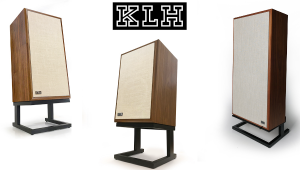Peter Wolf's Sure Sonic Cure for Hi-Fi Loneliness

I think it’s fair to say Peter Wolf is one badass Mamma Jamma Wolfa Goofa. The fast-talkin’ onetime DJ and longtime J. Geils Band frontman proves that point to the nth degree on his eighth solo album, A Cure for Loneliness (Concord), which teems with honest energy and reflective grace, from the steadfast template-setting of the lead track “Rolling On” to the shuffle blues of “How Do You Know” to the live bluegrass-stomp reworking of the 1980 J. Geils Band hit “Love Stinks.”
Wolf has definitive ideas about how he wants his music to be heard these days. “I’m not a fan of overly compressing things or limiting stuff,” he admits, “so I try to keep it warm with a good sonic quality. I tend to keep things dryer, which is a lot more to my personal taste.”
Not only that, but the man is very much a fan of having you hear this album on wax. Go check out the album cover, which shows Wolf with a 45 changer in his right hand and Sennheiser-styled headphones on his noggin. Wolf, 70, called in from his adoptive home of Boston (he’s actually a Bronx native) to discuss the sonic choices made for Loneliness, his favorite records and gear, and the inspiration for his kinetic live performing style. When it comes to the original Wolfa Goofa, rest assured your ears are gonna have fun long past the midnight sun.
Mike Mettler: Was there a certain type of sound you were striving for on A Cure for Loneliness? On every song, your voice is front and center in the mix, with not a lot of effects on it.
Peter Wolf: Yeah, definitely so; I’m glad you picked up on it. A lot of the recordings I like have a nice, limited plate that doesn’t get in the way — not too wet, and not too much effects. That’s how a lot of my records are made. But also, it depends on the song. For example, “Tragedy” has more of a slapback feel to it, and that becomes important to the song.
Mettler: Right out the box, “Rolling On” is essentially your mission statement. We’re getting you straight up down the middle. You are there.
Wolf: Well, thanks. If it’s working well, it should be straight up down the middle. (chuckles)
Mettler: Yeah, like a good fastball.
Wolf: When I went to check out the [Loneliness vinyl] test pressing, I figured I’d go to a friend’s high-end audio store to put it on a high-end system, and he said, “That’s funny — why did you put the voice all the way to the left?” I said, “No, it shouldn’t be on the left. Put on another recording.” He put on this great, classic Sinatra record, and the voice was all the way to the left. And I go, “Nope, it ain’t the vinyl. It’s your system, buddy!” (chuckles)
Mettler: Is vinyl still your favorite method of listening?
Wolf: Yeah, I really enjoy vinyl. I invested in a nice [Rega] turntable system, and I’ve tried some different cartridges since things have developed in the audiophile world. But it depends. I have nothing against digital. It’s just that, when you’re listening for a long time like I do, vinyl is just less fatiguing and more inviting if it’s played on the right kind of system. And there is the rub, because a lot of people think vinyl by itself has a magic to it — but it depends on what you’re playing it with.
For a while, I had very expensive, high-dollar cartridges for my turntable. With it, jazz had a warm, Ben Webster/Lester Young sound, and classical pieces and piano concertos sounded fantastic. But when I put on some of my R&B and blues stuff, it didn’t sound as inviting. So I ended up buying a cheap cartridge for about $100, and it magically did the trick. It’s not really a money thing — if it sounds good, that’s the key to it. It’s like food. If it tastes good, it’s good for you, and that’s all you need.
Mettler: For my reference turntable, I had to make sure I went with the higher-grade cartridge.
Wolf: Oh, good. Did you find it to be an important difference?
Mettler: I did. I found I got better detail on cymbal work and bass response, so I feel I made the right decision.
Wolf: People suggested to me at one point, “You should get two turntables; one just for your 45s and R&B.” You get into that audiophile world, and it becomes an interesting journey.
Mettler: It can become a rabbit hole. But like you said, what’s really best is to find a sound that works for you. Doesn’t matter if it costs 100 bucks or 1,000 bucks. Your ears are looking for a certain type of sound.
Wolf: Well put, Mike.
Mettler: Are you’re cool with streaming in general? Not only for radio, but for how people listen to music, even if you like vinyl better?
Wolf: Well, sonically, I agree with you. Streaming is just there, and it doesn’t make sense to comment on it because it ain’t going away. But if you want to make an argument — and there are some who feel strongly about this — not long after the 78, sound reproduction deteriorated. The 45 wasn’t as good as the 78, the 33 1/3 wasn’t as good as the 45 or the 78, etc., etc. And then came the cassette and the 8-track, and they weren’t as good as the vinyl, and then came the CD and the MP3. So you could make arguments, but I think the technological revolution made digital a very immense event that has drastically changed so much in the music world.
Mettler: Agreed. I do like having access to all my favorite stuff, to have that portable jukebox go along with me. We all walked around with Walkmans back in the day, now we do it with our phones.
Wolf: You could even take it a step beyond that with people walking around getting their rock & roll through little cigarette-size boxes, the transistor radio. It’s all a relative thing.
All I try to do is, I have a sonic sensibility. I’m not saying it’s anything unique or special, but it’s like a painter. You try to make the painting as aesthetically pleasing to yourself as possible, and that’s why I try to use very gifted engineers to be a part of these projects, studios that have the right kind of equipment that are able to give me the sound I’m looking for, and people who mix with the sensibility I need.
And then, of course there’s mastering, which is such a vital last element. Somebody like Bob Ludwig at Gateway Studios up in Portland [Maine] is the crème de la crème.
Mettler: I know a lot of artists get frustrated when they get the final product and it doesn’t sound quite like how they heard it in the studio, the way they heard it when they made it. To me, a good example of getting it right is “It’s Raining” — that snare at the very beginning, when the song kicks in, is so natural-sounding to me.
Wolf: There are so many elements involved. You have the playing, and the sound of the instrument itself. That’s the first thing. Then you have the room — how does it sound in the room? That’s the key. You’re in the room saying, “This is the sound we’re going for.” That’s your first reference point.
Then you go into the studio to see if it’s being translated into the control room, and being captured. That’s Step 1. Step 2 is mixing it in relation to everything else. And Step 3, which people don’t realize is as important as it is, is the mastering of everything you’ve done.
I try to explain to people who ask, “What is mastering?” I say, “Remember in the old days when you were sitting in front of your color TV, and you decided to add a little more hue and contrast? You’d change the shade of the green or the sharpness of the contrast and the colors. That’s kind of what mastering does.”
Mettler: I really feel like A Cure for Loneliness is a history lesson where you’re carrying the torch for a lot of styles that listeners can either revisit or come to for the first time, and maybe investigate your lineage a bit further.
Wolf: Ah, well, that’s nice. I mean, as I’ve said many times, it’s the sort of cliché where people ask guys in a band, “What did you get in the band for?” and they say, “I got into a band to meet girls.” But I was painting at the time, and music was such an important friend to me. It was a constant in my life. So for me, it was an opportunity to meet musicians.
I’ll never forget — I was going to art school [at the Boston Museum School of Fine Arts], and there was a band of just painters. Everybody was gathered together, and one of the guys singing forgot the words to the song. I said, “I know the words to that song!” “Well, why dont’cha come up and sing it?” I had enough wine in me that I went to do it, and once I got the bug, I said, “Wow, this is something else.”
Mettler: I say what you do is you paint with your voice.
Wolf: Well, that’s a very nice compliment, but I hope it’s not too far an abstract expressionism. (both laugh)
Mettler: I think your vocals paint in realism. And I think “How Do You Know” is a great example of you doing you, in the best way.
Wolf: Oh, thank you. We had a lot of tracks, so in choosing what went on, we assembled an assortment that somehow worked together. But as you said before, they came from different branches that we tried to have connect to the same tree, without it feeling awkward or stuck on.
Mettler: The J. Geils Band has a longstanding reputation for being such a dynamic live band. I can attest to that myself, having seen you play the Pine Knob Music Theatre outside of Detroit almost 16 years ago, and then again at Giants Stadium in East Rutherford, New Jersey in 2013. What’s your own benchmark for live performances?
Wolf: The template for that is still one of my favorite records of all time — James Brown, Live at the Apollo (1963). I got to spend almost every Wednesday at the Apollo during my high-school years. My high school was like 15 blocks away from the Apollo, so I got to check out the best and the greats. “Nothing but the best and the rest for the garbage,” as John Lee Hooker would say. (MM laughs) Still to this day, that James Brown record is an amazing document. That’s what R&B is all about.
Mettler: What live album best captures the live J. Geils Band legacy?
Wolf: It’s why I like Full House (1972) so much, because it’s representative of what we did. That might be my favorite. When people ask me what my Desert Island Pick would be, my answer is usually, “I ain’t goin’ to no desert island.” (MM laughs) It’s the Island of Love for me! (chuckles)
But I would say for someone who didn’t know anything about the J. Geils Band, Full House is the one. It might not have the greatest sound, but it captures a certain energy.
A longer version of this interview appears on Mike Mettler’s own site, soundbard.com.
- Log in or register to post comments






























































